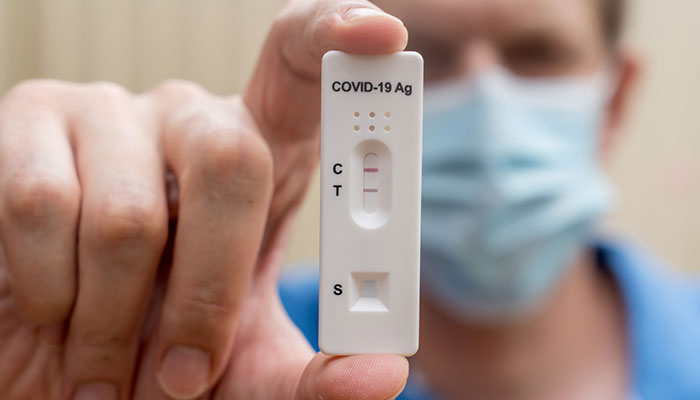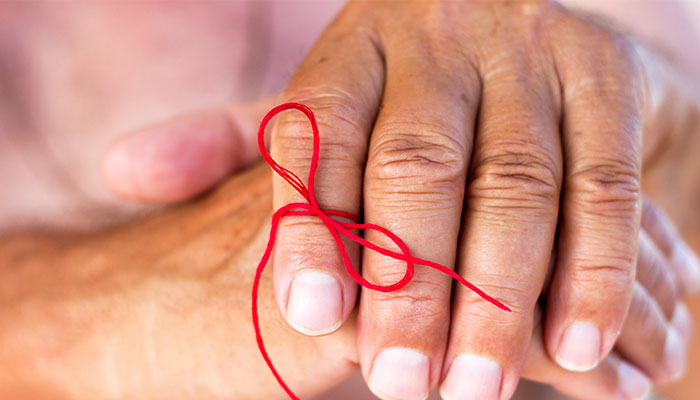The network of scars on the face of former NRL player James McManus tells a story: the thick slash through his eyebrow, the pale lines on his forehead, the nicks in his lips and chin.
James estimates he took at least 25 blows to the head throughout his playing career, ranging from serious concussions to what appeared at the time to be only minor injuries. His wife, Eshia, thinks the number could be up to double that.
At just 36, James is one of the thousands of people in Australia living with the effects of repeated head trauma.
Five years ago, he was identified as having symptoms that raise suspicion of chronic traumatic encephalopathy (CTE), a form of dementia related to repeated head injuries and found in a cross‑section of the community, from those who take part in contact and combat sports to members of the military and survivors of domestic violence.
The symptoms include mood disturbance with depression and anxiety, behavioural disturbance with a tendency towards impulsivity and anger, changes in personality, impaired judgment, confusion and cognitive decline.
Macquarie University neurologist Dr Rowena Mobbs and her team at the University’s Concussion Connect service have been working with CTE patients for four years.
Now, they have launched a new biobank to take that research to the next level.
Early detection and treatment gives hope
"It is often devastating to be diagnosed with probable CTE, and a diagnosis often also affects their families, but it is easier than not knowing and not getting help,” Rowena says .
“The Australian CTE Biobank, and its sister institution in New Zealand, will work together to gather quality data and store patient samples over the long term that can be reanalysed in future.
“We’ll be working with people who have suffered repeated head injuries to provide treatment and support, collect information on their symptoms, carry out brain scans and blood tests, and repeat these every 12 months to track the progression of the disease.”
Patients and their families are desperate for more support from the community, and from the clubs for which they have played.
Their aim is to develop specific biomarkers for CTE, so it can be detected and treated early.
The researchers hope this could mean effective blood testing within five years, just as we see on the horizon for Alzheimer’s and other forms of dementia.
“Make no mistake – this disease shatters lives,” Rowena says.
“Patients and their families are desperate for more support from the community, and from the clubs for which they have played.
“We are calling for greater funding from sporting bodies and the Australian Government for this pervasive issue. About half of us will have a head injury in our lifetimes.
“New patients present with CTE every week, highlighting just how important this research is for both athletes and the sports they represent."
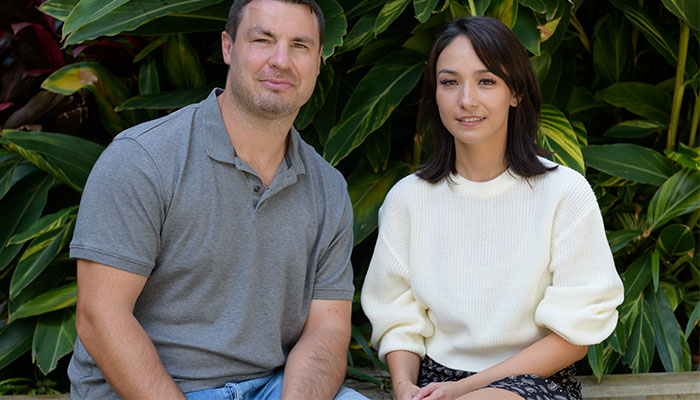
From trauma to hope: Former Newcastle Knight NRL football player James McManus and his wife Eshia are now determined to help others affected by multiple episodes of head trauma through the new Australian CTE Biobank.
In Australia, this means full contact sports like NRL, rugby union and AFL, combat sports like boxing and mixed martial arts, and even soccer and horse racing.
Rowena says to prevent CTE, there needs to be major national sporting reform and greater cohesion across policy, clinical practice, and occupational health and safety for professional athletes at risk of repetitive brain injury.
“CTE can be compared to other occupational diseases, with consideration given to insurance and other measures,” she says.
“We are inviting support for the research program from the NRL, AFL, and Rugby Australia, all of whose players have been shown to be affected by CTE.”
What it’s like to live with CTE
When asked where he’d be without the support of wife Eshia, James McManus’s answer is simple and heartbreaking.
“I don’t think I’d be here,” he says, as she reaches for his hand. “There was a period of time when life was genuinely falling apart.
“I’d have these rages that I couldn’t control, I was doing things on impulse – one day I just bought a car.
“I had a constant headache, so I’d have a couple of drinks to try to settle the pain down, which wasn’t healthy.
“There’s just this huge feeling of shame and guilt that you aren’t in control of yourself.”
For someone who has never been concussed, James explains it as the intense pain of impact followed by an instant fuzziness and confusion that makes it hard to concentrate thoughts or coordinate movements. It can be followed by a headache that lasts for days, and sometimes nausea and vomiting.
In July 2015, he was hospitalised due to concussion from what seemed like a relatively minor blow during a game, followed by retirement the next year without ever taking the field again.
The severity of his reaction rang alarm bells. When a doctor gave him a checklist of the symptoms associated with brain trauma, he ticked almost the whole page.
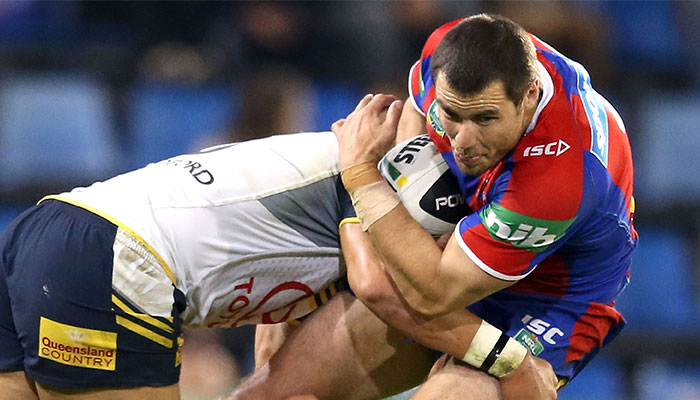
Collision course: James McManus in his playing days with the Newcastle Knights estimates he received at least 25 major blows to his head during his career.
“It was a lightbulb moment,” he says. “I realised this wasn’t just a ‘little’ concussion – this was a serious thing that was wrong with my brain.
“After three head knocks at the start of the 2015 season, I was experiencing anxiety, depression, headaches – but when I spoke to the doctor, they thought it was a mental health problem and I was referred to a psychologist instead of a neurologist.”
It was Eshia who first realised that something was wrong – and whatever it was, it was getting steadily worse.
“Early in his career, he’d get concussion symptoms from the big collisions, but towards the end, it seemed like it was all the time, even from small knocks that he once would have just shaken off,” she says.
“In that last year, we noticed a shift in his ability to manage those hits. His personality had changed too, but I didn’t know what was causing it.
“I just knew he was a very different person from the one I met and married. I thought he was being a bit of a jerk, and it really was a tough time for our relationship.
- Please Explain: What is a la Nina weather event?
- Groundbreaking family law firm bridges affordability gap
“Understanding that he has this brain injury and that’s why he’s behaving in these ways has made a huge difference.
“While I try to hold him as accountable as possible, I can’t hold him accountable for something he can’t control.”
James says the symptoms of CTE affect every aspect of a person’s life, from their health to their work.
“And it doesn’t only affect you. Think of your partner, your children, your family, your friends – some of those are people you haven’t even met yet when you’re 19 or 20.
“I’m better since I started treatment – I recognise the triggers now, and the interventions and daily medication help,” he says.
“But I’ve been experiencing headaches now for about seven years, and I really have to work at staying healthy, exercising and challenging my brain as much as I can.”
Spreading the word
James and Eshia have joined former rugby union player Michael Lipman and his wife Frances, and Australian boxer Jeff Fenech as ambassadors for the Australian CTE Biobank.
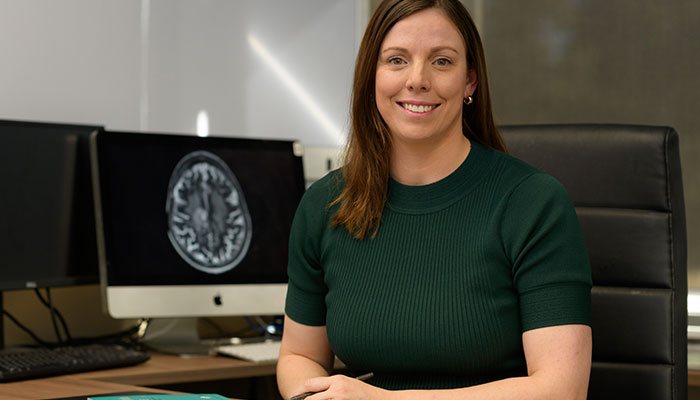
Banking on hope: Dr Rowena Mobbs says new patients with CTE present every week and is calling for major national sporting reform.
“There must be so many families like ours, families who are wondering why their loved one is behaving this way,” Eshia says.
“It’s so sad to think that some people have gone 20, 30 years down the track without help, without knowing what’s wrong.”
She says education on head trauma is vital, and not only for the players themselves: players’ partners also need to be aware of the warning signs, as they’re often the ones who first notice the changes.
“We want to encourage players and their families to get involved in this research and become familiar with the symptoms resulting from repeated head trauma, so they can seek independent advice and avoid any long-term impacts from playing a sport they love.
“This is why the biobank and its research is so important, to not only to protect current players but also the future generation.
“We believe anything that will make sport safer and help those struggling with the effects of repeated head trauma can only be a positive thing.”
Dr Rowena Mobbs is a neurologist at Macquarie Medical School and Director of the Australian CTE Biobank.
Learn more about the ACB and how you can be part of or support CTE research.
Concussion Connect is a neurology and psychology support and therapy program for those suffering from the effects of repeated head trauma. Learn more about the service.


